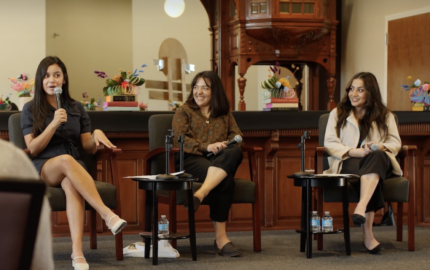
Editorial Cartoons: The Impact and Issues of an Evolving Craft
Many newspapers have decided not to hire a full-time editorial cartoonist, but instead publish the readily available work of syndicated cartoonists. To explore what impact these decisions and other changing circumstances related to editorial cartoons have on journalism, Nieman Reports asked cartoonists, editorial page editors, and close observers of cartooning to write out of their experiences and share their observations about how the long-time role that cartoons have played in journalism and democracy is being affected. – Melissa Ludtke, Editor
In recent years, punditry, opinion and so-called infotainment have permeated newscasts and newspapers to such a degree that it is now difficult for the average news consumer to distill the news from what they read and watch. Can responsible journalism survive in this environment? Yes. And it is our duty to ensure it does. The First Amendment provides special protection for freedom of the press, but along with that comes the responsibility to safeguard the people’s right to know.
First, though, we must acknowledge the root of the problem. Punditry and bias are mere symptoms of a far more insidious malady affecting journalism: the profit motive. While all news media have become victims of the bottom line, television news organizations have capitulated most to the pressures of their corporate owners, who have proven willing to sacrifice standards, ethics, professionalism and the public trust in order to make more money.
These news outlets care little about journalists’ critical role in a democracy, about their responsibility to provide fair, balanced, broad and in-depth news coverage. The mega-corporations that devoured the major news organizations care only about doing whatever it takes to increase readership and viewership. The infusion of bias and entertainment into news has been one result of this business strategy.
For one cable network, Fox, this strategy has resulted in a massive ratings hike and increased revenues. But for most others, any short-term gains experienced have long since dissipated. While logic would dictate a reversal of course, instead they are resorting to even more entertainment and opinion programming in a futile attempt to lure viewers. In mid-October, for example, CNN launched a current events game to be played in 3,200 restaurants and sports bars. Called “Anderson Cooper 360° Challenge,” the network’s prime-time news anchor Cooper will host the competition. The winner will appear on CNN with Cooper and take home a 50-inch plasma television set. Can anyone truly believe informing the public is the motive behind this degrading charade?
We can improve the state of journalism in this country while still recognizing the business needs of news organizations. News can make money without reducing standards, resorting to punditry instead of reporting, and threatening the integrity of journalism. But news will never make as much money as a popular sit-com or a reality show. It shouldn’t have to. The most precious dividend of responsible journalism is its indispensable role in supporting a free and open society.
Profit-hungry corporations can be made to see this if the public, especially the shareholders of these companies, get involved in a very vocal manner by writing, calling or e-mail-ing news organizations to demand a return to quality news coverage.
Conscientious journalists must also boldly voice their concerns and help create a national discussion about the critical need to salvage a responsible free press. Reporters must honestly assess and report about issues in their own industry informing the public in a transparent manner about the problems being faced.
In addition, journalists need to examine their personal motives for choosing to be in the news profession. News executives need to identify keep or hire people who are driven by a sincere sense of public service and respect for the First Amendment. These same news executives must be role models who respect news ethics, traditions and responsibilities. Those who are motivated, instead, by their high salaries, stock options, bonuses and car allowances should be confronted by their superiors or by newsroom ombudsmen with the authority to discipline or fire them.
Executives and newsroom journalists together must openly discuss programming imperatives. Instead of only providing the public with what news managers believe people want to know, put more emphasis on coverage about events and news the public needs to know about. This doesn’t mean there’s no room for pundits and opinion programming. Talk shows and debate programs where hosts stake out and defend positions are natural arenas for opinion brokers, but no place for journalists. News anchors and reporters, by the same token, must never stray from the news arena or offer their opinions. The line between news and opinion, between journalists and pundits, must be clear and unmistakable in the mind of the public.
Finally, it is up to those of us who care deeply about journalism’s honorable role in our society to try to renew the idealism of colleagues and news consumers alike who have grown complacent or cynical. We must share our abiding faith in this institution and show, by our actions and words, that we mean to protect it at all cost. We must.
Bonnie M. Anderson, author of “News Flash: Journalism, Infotainment, and the Bottom-Line Business of Broadcast News,” is a 27-year news veteran, winner of seven Emmy Awards, and a Pulitzer Prize finalist.
First, though, we must acknowledge the root of the problem. Punditry and bias are mere symptoms of a far more insidious malady affecting journalism: the profit motive. While all news media have become victims of the bottom line, television news organizations have capitulated most to the pressures of their corporate owners, who have proven willing to sacrifice standards, ethics, professionalism and the public trust in order to make more money.
These news outlets care little about journalists’ critical role in a democracy, about their responsibility to provide fair, balanced, broad and in-depth news coverage. The mega-corporations that devoured the major news organizations care only about doing whatever it takes to increase readership and viewership. The infusion of bias and entertainment into news has been one result of this business strategy.
For one cable network, Fox, this strategy has resulted in a massive ratings hike and increased revenues. But for most others, any short-term gains experienced have long since dissipated. While logic would dictate a reversal of course, instead they are resorting to even more entertainment and opinion programming in a futile attempt to lure viewers. In mid-October, for example, CNN launched a current events game to be played in 3,200 restaurants and sports bars. Called “Anderson Cooper 360° Challenge,” the network’s prime-time news anchor Cooper will host the competition. The winner will appear on CNN with Cooper and take home a 50-inch plasma television set. Can anyone truly believe informing the public is the motive behind this degrading charade?
We can improve the state of journalism in this country while still recognizing the business needs of news organizations. News can make money without reducing standards, resorting to punditry instead of reporting, and threatening the integrity of journalism. But news will never make as much money as a popular sit-com or a reality show. It shouldn’t have to. The most precious dividend of responsible journalism is its indispensable role in supporting a free and open society.
Profit-hungry corporations can be made to see this if the public, especially the shareholders of these companies, get involved in a very vocal manner by writing, calling or e-mail-ing news organizations to demand a return to quality news coverage.
Conscientious journalists must also boldly voice their concerns and help create a national discussion about the critical need to salvage a responsible free press. Reporters must honestly assess and report about issues in their own industry informing the public in a transparent manner about the problems being faced.
In addition, journalists need to examine their personal motives for choosing to be in the news profession. News executives need to identify keep or hire people who are driven by a sincere sense of public service and respect for the First Amendment. These same news executives must be role models who respect news ethics, traditions and responsibilities. Those who are motivated, instead, by their high salaries, stock options, bonuses and car allowances should be confronted by their superiors or by newsroom ombudsmen with the authority to discipline or fire them.
Executives and newsroom journalists together must openly discuss programming imperatives. Instead of only providing the public with what news managers believe people want to know, put more emphasis on coverage about events and news the public needs to know about. This doesn’t mean there’s no room for pundits and opinion programming. Talk shows and debate programs where hosts stake out and defend positions are natural arenas for opinion brokers, but no place for journalists. News anchors and reporters, by the same token, must never stray from the news arena or offer their opinions. The line between news and opinion, between journalists and pundits, must be clear and unmistakable in the mind of the public.
Finally, it is up to those of us who care deeply about journalism’s honorable role in our society to try to renew the idealism of colleagues and news consumers alike who have grown complacent or cynical. We must share our abiding faith in this institution and show, by our actions and words, that we mean to protect it at all cost. We must.
Bonnie M. Anderson, author of “News Flash: Journalism, Infotainment, and the Bottom-Line Business of Broadcast News,” is a 27-year news veteran, winner of seven Emmy Awards, and a Pulitzer Prize finalist.


